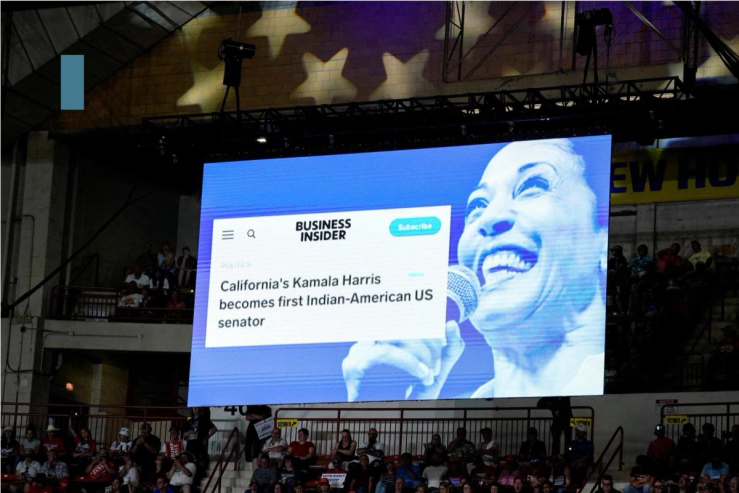The News
Donald Trump’s campaign has been rolling out traditional attack lines against their new opponent, Vice President Kamala Harris — tying her to “radical” policies and blaming her for illegal border crossings and inflation under President Biden.
Donald Trump, the candidate, is another story.
On Wednesday, days after his campaign notched a big ad buy in battleground states honing in on Harris’ record with the border, the former president did what he does best: Thrust himself back into the spotlight. Speaking on stage at the National Association of Black Journalists conference in Chicago, Trump attacked Harris with a different angle, falsely suggesting she’d only recently “happened to turn” Black after presenting herself as South Asian. On Truth Social, he kept it up, again posting about the topic, while the White House press secretary denounced his comments as “repulsive.” On Thursday morning, he shared a family picture of a young Harris in traditional Indian garb. (Harris’ mother is from India and her father is from Jamaica; she has discussed her biracial heritage throughout her career and attended Howard University, a historically Black learning institution.)
The Trump campaign had overwhelmingly been focused on hitting Harris on her record. Now faced with a new line from its boss, it began to find ways to incorporate it.
“I think he pointed out the fundamental chameleon-like nature of Kamala Harris,” his vice presidential pick, JD Vance, told reporters on his plane shortly after the NABJ conference.
At a rally in Pennsylvania after Wednesday’s event, the campaign projected onto a big screen an old Business Insider headline that described Harris as the “first Indian-American US senator,” implying that coverage of one half of her ethnic background somehow invalidated coverage of the other half. Alina Habba, one of the opening speakers, seemed to also reference Trump’s remarks, saying “unlike you, Kamala, I know who my roots are and where I come from.”
On X, the official “Trump War Room” account posted a handful of references to the comments, mostly from others. Posts included a CNN clip in which Sen. Tom Cotton defended them, which made no mention of the substance in the text, and a retweet of a short clip of Harris meeting with Mindy Kaling.
But it was also still unclear whether the Trump episode was a one-off eruption, or the start of a new campaign front. Overwhelmingly the campaign’s message remained the same as before and by Thursday morning, its accounts on X had largely pivoted to pushing Harris to respond to an Olympics gender testing controversy. A 15-point list of items purporting to expose the “Real Kamala” that the RNC Research account posted included no mention of her ethnicity.
Some allies were openly hoping to move on, even ones who are typically eager to defend Trump’s more controversial rhetoric. Missouri Sen. Josh Hawley said it wasn’t “a great idea for either of the parties to be playing racial identity politics,” and Sen. Tommy Tuberville of Alabama said he was not going to “get involved in that,” and would personally be focusing his commentary on “how bad our country is in shape right now because of her.” Others were more eager to jump in, like Rep. Lauren Boebert of Colorado, and trust that Trump’s instincts were correct.
Within Trump’s orbit, people also seemed privately split between clapping along with Trump’s attack or just resigning themselves to it. Responses ranged from metaphorical shrugs — that this is part of the deal that comes with working on behalf of his election — to individuals who praised the appearance as “awesome.” Overall, the most common response seemed to be that this event would quickly be eclipsed by the next piece of news. The people who liked or disliked Trump before the NABJ would have the same feelings afterwards, they argued, and he showed he was willing to go into a hostile environment and take questions.
But veteran Trump watchers noted that the episode fit a familiar pattern — an extreme, even self-defeating, desire to dominate the political conversation at any cost. Some allies blamed his 2020 loss on a related failure to focus voters on Biden’s vulnerabilities and instead find new ways to demand they validate his own performance. Similarly, some observers credited his victory in 2016 to an uncharacteristic decision to stay on message in the final days of the race while Hillary Clinton dealt with a briefly reopened FBI investigation.
The NABJ interview notably came at a rare time, arguably the first since early in the primaries, in which a political rival was enjoying an extended positive stretch of coverage.
“The campaign wants to be defined by discipline. They want to be very on message all the time, and the message is: Make this a referendum on the Biden-Harris record,” Alex Conant said. “Trump doesn’t like giving up the spotlight, and what he did yesterday, like, for the first time since he was shot, he led the news, which is what he wants.”
Asked about their messaging this week, the campaign sent a statement that did not include mention of the Trump-angled attacks on race. Trump spokesman Brian Hughes reiterated many of the core arguments the campaign is making against Harris: Pointing to her history with the border, tying her directly to Joe Biden, and bringing up some of her more liberal past stances like abolishing private healthcare.
“Harris is weak, failed and dangerously liberal,” Hughes said. “Her dishonesty is demonstrated by her active role in years of gaslighting Americans about the mental competency of Biden, and now her efforts every day to delete her California liberal past. Kamala tries to shape shift to obscure reality.”
Meanwhile, three of Trump’s top Black surrogates are expected to hit the airwaves today following his NABJ appearance, CNN reported.
In this article:
Shelby’s view
This is often the reality when working with Trump: Current and former aides have always told me that, at the end of the day, the candidate has the last word — and he has a sometimes unique ability to complicate things for himself and his campaign.
This unwillingness to get ahead of Trump was already visible in the days leading up to the NABJ event, as Republicans debated the merits of criticizing Harris as a “DEI” nominee, a frame that House Republican leaders asked their members to avoid. Trump’s campaign did not initially join in on the “DEI” talk and directed Republicans to other topics — but at the same time senior aides were reluctant to concede that these attacks were “off-limits,” knowing the candidate might adopt them later on.
In some ways, the campaign has already been built to work around this dynamic, leaving Trump free to emphasize his favored topics and his staff to focus on messages they see as most effective in winning over voters. His onstage remarks might frequently play up his support for Jan. 6 defendants, for example, but those topics have not been a focus of paid media or talking points for surrogates.
To be clear, Trump also incorporates the more traditional attacks that his advisors seem to favor. His convention address was a display of this tension in action, with Trump frequently departing from his tightly honed teleprompter speech to go off on his own tangents.
Until recently, the results had been positive for Trump. After prior races that featured infighting between some advisors trying to discipline the candidate and others arguing for a “Let Trump be Trump” approach — often through leaks to the press — the new approach seemed to keep everyone on the same page. But everything is different when the campaign is on defense in the press and in the polls, and the episode showed how fragile the arrangement could be as they head into another month where Harris is likely to dominate the news with her running mate selection and convention.
Notable
- Democrats have already been debating how Kamala Harris should navigate talk of race and sex, with some believing it needs to be responded to forcefully and others arguing it’s a distraction that should be ignored, Semafor reported last week.
- People close to Trump doubt that these kinds of more personal attacks will be effective as the campaign heads into the home stretch of this election, The Washington Post reported.
Room for Disagreement
Conservative commentator Matt Walsh argued that “the stuff about Kamala’s race was fine for Trump to bring up” and that his overall performance on Wednesday was beneficial, making “him look honest, cool, and unbothered to the average voter.” But he also cautioned against leaning too much on personal attacks versus focusing on Harris’ policies and record.
“He should be taking the attention and shifting it back to the stuff that will actually hurt her. No voter gives a shit about the fact that Kamala is biracial. No voter is going to vote for Trump because they find out Kamala has an Indian mom,” Walsh tweeted.


